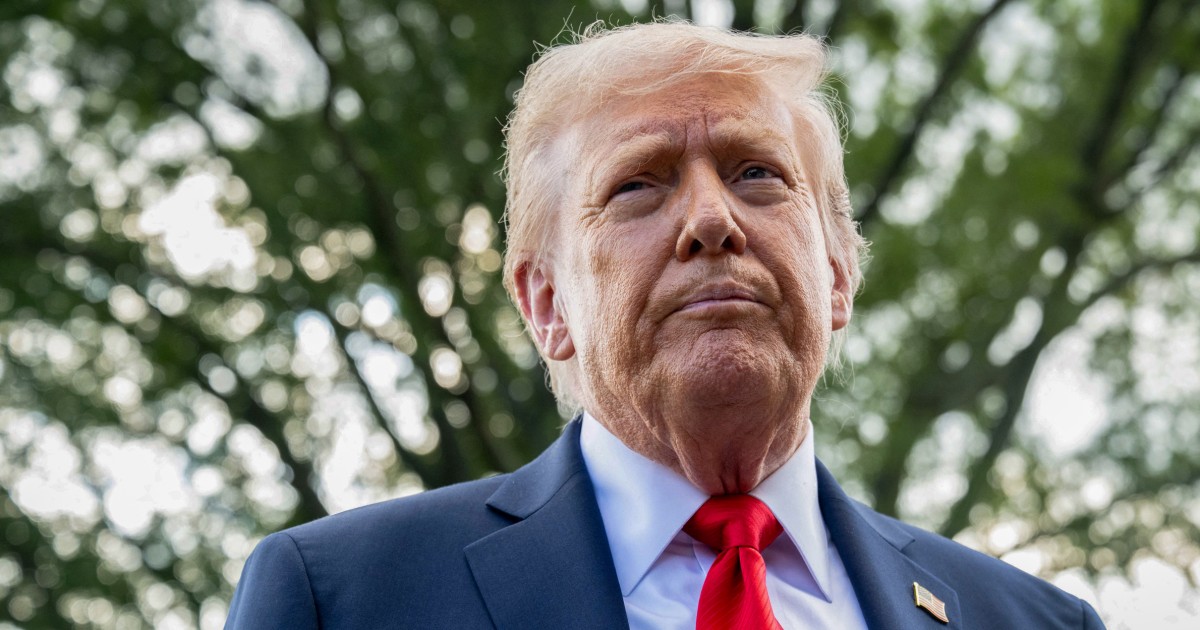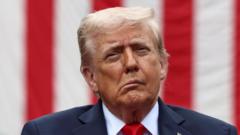Will Trump Impose Major Sanctions on Russia If NATO Acts?

Published: 2025-09-13 15:33:56 | Category: politics diplomacy GNEWS Search
In a recent statement, former President Donald Trump indicated his readiness to impose significant sanctions on Russia, contingent upon NATO countries aligning with these measures and ceasing oil purchases from Moscow. Trump also advocated for steep tariffs on China, emphasising the geopolitical ties between China and Russia. His remarks highlight the ongoing complexities of international relations and economic strategy in response to the Russia-Ukraine conflict.
Last updated: 29 September 2023 (BST)
Key Takeaways
- Trump calls for major sanctions on Russia, depending on NATO compliance.
- He urges NATO countries to implement substantial tariffs on China.
- Trump aims to shift the economic burden away from the US while increasing pressure on Russia.
- The former president's strategy hints at a broader geopolitical landscape involving China.
- Some NATO members, like Hungary and Slovakia, continue to purchase Russian oil.
The Context of Trump's Proposed Sanctions
Donald Trump's recent statements reflect a growing urgency regarding Russia's invasion of Ukraine and the need for a united NATO response. Sanctions have been a critical tool employed by nations to exert pressure on governments engaged in military aggression. Trump's focus on NATO countries signifies a strategic shift to leverage collective action against Russia.
What Are Sanctions?
Sanctions are punitive measures imposed by countries or international bodies to influence or change the behaviour of a targeted nation. They can take various forms, including economic sanctions (such as trade restrictions and tariffs), diplomatic sanctions (such as downgrading relations), and military sanctions (such as arms embargoes). The ultimate goal of sanctions is to compel the targeted state to comply with international law or to deter undesirable actions.
The Importance of NATO Unity
Trump's insistence on NATO countries following suit with sanctions underscores the importance of unity within the alliance. NATO, or the North Atlantic Treaty Organization, is a military alliance established in 1949, comprising 31 member countries committed to mutual defence. A cohesive response from NATO is crucial for establishing a strong front against threats to international security.
Trump's Specific Proposals
In his Truth Social post, Trump detailed two primary proposals: significant sanctions on Russia and substantial tariffs on China. He argues that these measures are essential to counteract Russia's military actions and to limit China's influence over Russia.
Sanctions on Russia
Trump's call for sanctions includes a demand for NATO countries to halt their purchases of Russian oil. This approach is designed to weaken Russia economically, thereby reducing its capacity to sustain military operations in Ukraine. The rationale is that diminished revenue from oil sales would force Russia to reconsider its aggressive stance.
Tariffs on China
Trump's suggestion to impose 50% to 100% tariffs on China is rooted in the belief that these tariffs could disrupt the economic ties between China and Russia. He posits that China holds significant leverage over Russia, and imposing tariffs would weaken this relationship. Trump's proposal suggests a dual strategy of addressing both Russian aggression and Chinese influence concurrently.
The Current Landscape of Sanctions and Tariffs
As of now, Trump's threats to impose sanctions on Russia have not materialised into actionable measures. Analysts suggest that this reluctance stems from his desire to broker a peace deal between Russia and Ukraine. The complexities surrounding international diplomacy play a significant role in shaping these decisions.
The Role of Economic Strategies
Sanctions and tariffs are not merely punitive; they are also strategic economic tools designed to reshape global alliances and influence international behaviour. The effectiveness of these measures often depends on the unity and commitment of the nations imposing them. Thus, Trump's focus on rallying NATO allies indicates an understanding of the need for a concerted effort.
Challenges to NATO's Cohesion
Despite Trump's calls for unity, some NATO members, such as Hungary and Slovakia, continue to purchase fossil fuels from Russia. This ongoing trade undermines the collective effort to apply pressure on Moscow and poses challenges to achieving a unified response. The differing economic dependencies among NATO nations complicate the implementation of sweeping sanctions and tariffs.
The Impact of Continued Russian Oil Purchases
The ongoing purchase of Russian oil by certain NATO countries dilutes the effectiveness of proposed sanctions. Trump emphasises that such purchases weaken negotiating positions against Russia. The dilemma faced by these nations often revolves around balancing economic needs with political and moral imperatives regarding the conflict in Ukraine.
Potential Consequences of Trump's Proposals
Should Trump’s calls for sanctions and tariffs be enacted, the geopolitical landscape could shift significantly. A united front from NATO could lead to a substantial decrease in Russia's economic capabilities, potentially altering its military strategies. Conversely, the imposition of high tariffs on China may escalate tensions between the US and China, potentially leading to a broader trade conflict.
What Happens Next?
The future actions of both NATO and Trump in relation to sanctions and tariffs remain uncertain. As international dynamics continue to evolve, the effectiveness of economic measures against Russia and China will depend on various factors, including diplomatic negotiations and economic repercussions. Analysts will be closely watching how this situation unfolds in the coming months.
Conclusion
Trump's recent statements are a clarion call for NATO unity in the face of Russian aggression and an effort to weaken the ties between Russia and China. The implications of his proposals could reshape international relations, but their success hinges on the collective action of NATO members. As the geopolitical landscape evolves, the focus on sanctions and tariffs will remain a crucial aspect of global diplomacy.
How will the responses from NATO and other countries shape the future of international relations regarding Russia and China? #Sanctions #NATO #Geopolitics
FAQs
What are the current sanctions on Russia?
Current sanctions on Russia include trade restrictions, asset freezes on individuals and entities, and bans on certain exports. These measures aim to pressure Russia to cease its military actions in Ukraine.
How do tariffs affect international trade?
Tariffs increase the cost of imported goods, making them less competitive against local products. This can lead to reduced trade volumes and potentially incite retaliatory measures from affected countries.
Why is NATO unity important in responding to Russia?
NATO unity is essential as it strengthens the alliance's negotiating power and deterrent capabilities against aggressive actions by nations like Russia. A cohesive response can enhance the effectiveness of sanctions and military support.
What impact do sanctions have on Russia's economy?
Sanctions can significantly affect Russia's economy by restricting access to international markets and financing. This can lead to reduced revenues, economic contraction, and pressure on the government to change its policies.
What is the relationship between China and Russia?
China and Russia share a strategic partnership, collaborating on various political and economic fronts. This relationship has strengthened over time, particularly in response to Western sanctions and pressures.



